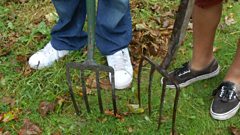
14/01/2013
Mel Giedroyc starts listening to chapter 1 of 'Dustbin Baby' by Jacqueline Wilson. Plus, Dick and Dom with everyday science in How Dangerous Is Your Garden.
Last on
Clip
-
![]()
Dick and Dom: Soil
Duration: 12:56
Chapters
-
How Dangerous Is Your Garden – Part 1
The dangerous duo Dick and Dom enter the garden to explore the science of soil.
Duration: 14:10
Jacqueline Wilson - My Life In Five Books – Part 1
The former children’s laureate sits down with presenter Stuart Cosgrove to discuss her favourite childhood book, The Diary Of Anne Frank.
Duration: 04:37
A Guide To Woodland Birds
Bird watchers Brett Westwood and Stephen Moss track down the songs of more rare and beautiful birds including the tawny owl and the sparrowhawk.
Duration: 14:02
Mel’s Magical Mystery Tour – The Calvert Landfill
Ian Marchant hitches a ride to the waste site in Buckinghamshire to meet those brave souls whose office space is a complete tip.
Duration: 06:35
Dustbin Baby – Part 1
The first part of Dame Jacqueline Wilson’s story of 14 year old April who was abandoned in a dustbin as a baby.
Duration: 14:24
Activity 1. Worm-charming
Yes - “worm-charming”! The soil in your garden is full of worms. They tend to stay underground, but can be brought up to the surface by vibrations. Scientist Lucy Robinson from the Natural History Museum showed us two ways that you can create these vibrations:
��
Stamping - rapid stamping on the ground with your feet for a few minutes can bring the worms up. And the more the merrier - pull in others to help you stamp if you can. Keep an eye out for the worms as they come up, so that you don’t tread on them!
��
Fork-twanging - if you’ve got a garden fork handy, push it into the ground, then wiggle it back and forward quickly for a few minutes.��
��
In the programme, Dick and Dom’s teams compete against each other to see who can make more worms appear. Whichever technique you try, you’ll probably have more success on a rainy day.
Activity 2. Have a dig around
Get to know your garden better by digging a hole and examining the soil for yourself. Is it crumbly? Or clay-like? Can you see any worms or other living creatures in it?
��
Soil is a mixture of ground-down rocks and stones, and organic matter such as fragments of rotten leaves. The worms and other organisms in the soil are constantly recycling the dead leaves and other decomposing matter in the garden - so as Dom said, your soil is actually full of worm-poo! But that’s what keeps the soil full of nutrients, so worms are definitely a gardener’s friend.
��
Remember to wash your hands when you’ve finished digging in the soil.
Activity 3. Make a grass whistle
Did you know you can make a sound with a blade of grass?
��
First, find a blade of grass around 10cm long. Position your hands so that your two thumbs are side by side. You’ll see they are squashed together at the base, and also at the knuckle, but in between there’s a slight gap. Take the blade of grass, and reposition your hands so that the blade of grass runs down between your thumbs, and through the gap in the middle. The blade of grass should be side-on as you look through the gap. Now put your mouth to the gap and BLOW! If you’re lucky, you may get something that sounds like a birdcall. (If you don’t, keep practising, and try adjusting the blade of grass, making sure it’s held tight). What’s happening?
��
The grass whistle works on the same principle as a reed instrument like a clarinet or a saxophone – though you don’t have as much control over the note played! The note is created because as you blow past the blade of grass, it flutters back and forward, vibrating the air. These vibrations travel through the air to our ears where we hear them as sound. The broader the blade of grass, the lower the sound you will produce.
Action Line
If you’ve been upset by April’s story in Dustbin Baby, there are people you can talk to who can give you help and support.��
��
ChildLine
If you need to talk to someone about bullying, ChildLine is the UK’s free, 24-hour confidential helpline for children and young people who need to talk. Trained counsellors are there to provide comfort, support and advice about any problem that’s on your mind.�� Contact them 24 hours a day, every day, by phone on 0800 1111 or .�� Calls are free from all existing networks – landline and mobile.Beatbullying
Beatbullying works with children and young people across the UK to provide them with all important opportunities to make positive and lasting changes to their lives and outlook. In particular, they work intensively with those so deeply affected by bullying that they can barely face going to school that next morning.
NSPCC
If you’re an adult concerned about a child’s safety, the NSPCC is a charity specialising in child protection and the prevention of cruelty to children.�� They operate a free 24-hour helpline that provides information, advice and counselling. Contact them by phone on 0808 800 5000, email help@nspcc.org.uk��or
Barnardo's
Barnardo's has more than 100 years' experience of fostering and can offer help and support to someone trying to trace their birth family. They also operate fostering and adoption agencies and recruit a wide range of foster carers from across the UK. Contact them by phone on 0800 0277 280, or
Broadcast
- Mon 14 Jan 2013 16:0091�ȱ� Radio 4 Extra

